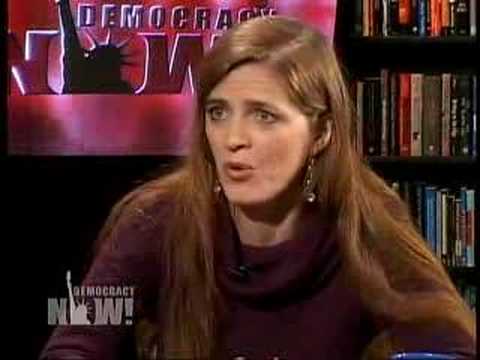The United Nations may not accomplish much, but it is the most important public forum in which the U.S. defends its values and interests to the world. Samantha Power, who is President Barack Obama’s choice to replace outgoing UN Ambassador Susan Rice, is a particularly radical pick and should face tough questions and scrutiny when she appears before the Senate Foreign Relations committee for confirmation, including these.
1. Libya: You are widely viewed as the architect of the Obama administration’s policy on Libya, through your “Responsibility to Protect” doctrine. In retrospect, would you say that the Libya intervention was justified?
2. Benghazi: You were a senior White House security advisor during the Benghazi terror attacks of Sep. 11, 2012. Your predecessor misled the country about Benghazi. What did you know about Benghazi, and when?
3. Congress: The Libya intervention was undertaken without any form of approval from Congress. Do you think that approval from the United Nations and the Arab League is sufficient to launch military operations?
4. Syria: You have served as chair of the Atrocities Prevention Board, and yet the Obama administration has not stopped the mass killing of tens of thousands of civilians in Syria. Why have you not spoken out about it?
5. Iran: Despite the administration’s promises, diplomacy with Iran has not stopped its nuclear weapons program. Will you seek UN Security Council approval of military force to enforce the UN’s own resolutions?
Update: Ed Lasky notes that in a 2008 op-ed, Power mocked the Bush administration’s concern about Iran as an “imagined crisis,” and said that “redundant reminders that military force is still ‘on the table'” strengthen the regime. Given that President Obama often issues such reminders, does Power still hold those views?
6. Israel: In 2002, you advocated the use of a “mammoth protection force” to impose a solution on Israel and the Palestinians, saying “external intervention” was needed. Yes or no–do you still personally hold that view?
Update: In a 2003 book, Power is quoted as suggesting that Israel committed “war crimes” in Jenin in 2002, long after the so-called “massacre” there was shown to be false, and reported as such by the New York Times.
7. Jews: In that same 2002 interview, you said that the government must “alienate a domestic constituency of tremendous political and financial import,” presumably the Jewish community. Have your views changed?
8. Human Rights Council: The Obama administration’s participation in the UN Human Rights Council has only given legitimacy to anti-American and anti-Israel attacks. How do you justify our continued involvement?
9. Human Rights Generally: During the time you served as a senior human rights advisor, the Obama administration was described as “dangerously silent on human rights.” How do you explain that failure?
10. Clinton “monster”: During the 2008 presidential campaign, you were forced to take a back seat after calling Hillary Clinton a “monster.” Shouldn’t one of our top diplomats have more reliable temperament?
Update: Another question that did not make my list, but could almost substitute for all of the above: in 2003 you proposed the U.S. apologize for “crimes committed, sponsored, or permitted by the United States.” Do you still believe in that “doctrine of the mea culpa”–and to whom would you, as UN Ambassador, apologize?

COMMENTS
Please let us know if you're having issues with commenting.